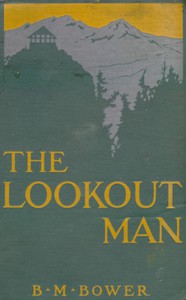The Lookout Man by B. M. Bower (good books to read for adults .txt) 📗

- Author: B. M. Bower
Book online «The Lookout Man by B. M. Bower (good books to read for adults .txt) 📗». Author B. M. Bower
Any man walking beside Marion would have made him wild with jealousy; but Hank Brown! Hank Brown, holding her by the arm, walking with her more familiarly than Jack had ever ventured to do, for all their close friendship! Calling her cute—why cute, in particular? Did Hank, by any chance, refer to Marion's little strategies in getting things for Jack? The bare possibility sickened him.
He stood and watched until they reached the trail and passed out of sight among the trees, their voices growing fainter as the distance and the wind blurred the sounds. Had they looked back while they were climbing out of the gulley, they must have seen him, for he stood out in the open, making no attempt at concealment, not even thinking of the risk. When they had gone, he stood staring at the place and then turned and tramped apathetically back to his cave.
What was Marion doing with Hank Brown, the one man in all this country who held a definite grudge against Jack? What had she done, that Hank should consider her so cute? Was the girl playing double? Loyalty was a part of Jack's nature—a fault, he had come to call it nowadays, since he firmly believed it was loyalty toward his father that had cost him his mother's love; since it was loyalty to his friends, too, that had sent him out of Los Angeles in the gray of the morning; since it was loyalty to Marion that had held him here hiding miserably like an animal. Loyalty to Marion made it hard now to believe his own eyes when they testified against her.
There must be some way of explaining it, he kept telling himself hopelessly. Marion—why, the girl simply couldn't pretend all the time. She would forget herself some time, no matter how clever she was at deception. She couldn't keep up a make-believe interest in his welfare, the way she had done; if she could do that—well, like Hank Brown, he would have to hand it to her for being a lot cleverer than he had given her credit for being. "If she's been faking the whole thing, she ought to go on the stage," he muttered tritely. "She'd make Sarah Bernhardt look like a small-time extra. Yes, sir, all of that. And I don't quite get it that way." Then he swore. "Hank Brown! That hick—after having her choice of town boys, her taking up with that Keystone yap! No, sir, that don't get by with me." But when he had gone a little farther he stopped and looked blackly down toward the Basin. A swift, hateful vision of the two figures walking close together up that slope struck him like a slap in the face.
"All but had his arm around her," he growled. "And she let him get by with it! And laughed at his hick talk. Huh! Hank Brown! I admire her taste, I must say!"
Up near the peak the wind howled through the pines, bringing with it the bite of cold. His shoulders drawn together with the chill that struck through even his heavy sweater and coat, he went on, following the tracks he had made coming down. They were almost obliterated with the snow, that went slithering over the drifts like a creeping cloud, except when a heavier gust lifted it high in air and flung it out in a blinding swirl. Battling with that wind sent the warmth through his body again, but his hands and feet were numb when he skirted the highest, deepest, solidest drift of them all and crept into the desolate fissure that was the opening to his lair.
Inside it was more dismal than out on the peak, if that could be. The wind whistled through the openings in the roof, the snow swirled down and lay uneasily where it fell. His camp-fire was cheerless, sifted over with white. His bed under the ledge looked cold and comfortless, with the raw, frozen hide of the bear on top, a dingy blank fringe of fur showing at the edges.
Jack stood just inside, his shoulders again hunched forward, his chilled fingers doubled together in his pockets, and looked around him. He always did that when he came back, and he always felt nearly the same heartsick shrinking away from its cold dreariness. The sun never shone in there, for one thing. The nearest it ever came was to gild the north rim of the opening during the middle of the day.
Today its chill desolation struck deeper than ever, but he went stolidly forward and started a little fire with a splinter or two of pitch that he had carried up from a log down below. Hank had taught him the value of pitch pine, and Jack remembered it now with a wry twist of the lips. He supposed he ought to be grateful to Hank for that much, but he was not.
He melted snow in a smoky tin bucket and made a little coffee in another bucket quite as black. All his food was frozen, of course, but he stirred up a little batter with self-rising buckwheat flour and what was left of the snow water, whittled off a few slices of bacon, fried that and afterwards cooked the batter in the grease, watching lest the thick cake burn before it had cooked in the center. He laid the slices of bacon upon half of the cake, folded the other half over upon them, squatted on his heels beside the fire and ate the ungainly sandwich and drank the hot black coffee sweetened and with a few of the coarser grains floating on top. While he ate he stared unseeingly into the fire, that sputtered and hissed when an extra sifting of snow came down upon it. The cave was dusky by now, so that the leaping flames made strange shadows on the uneven rock walls. The whistle of the wind had risen to a shriek.
Jack roused himself when the fire began to die; he stood up and looked around him, and down at his ungainly clothes and heavy, high-cut shoes laced over thick gray socks whose tops were turned down in a roll over his baggy, dirt-stained trousers. He laughed without any sound of mirth, thinking that this was the Jack Corey who had quarreled over the exact shade of tie that properly belonged to a certain shade of shirt; whose personal taste in sport clothes had been aped and imitated by half the fellows he knew. What would they think if they could look upon him now? He wondered if Stit Duffy would wag his head and say "So-me cave, bo, so-me cave!"
Then his mind snapped back to Hank Brown with his hand clasping Marion's arm in that leisurely climb to the trail. His black mood returned, pressing the dead weight of hopelessness upon him. He might as well settle the whole thing with a bullet, he told himself again. After all, what would it matter? Who would care? Last night he had thought instantly of Marion and his mother, and he had felt that two women would grieve for him. Tonight he thought of Marion and cast the thought away with a curse and a sneer. As for his mother—would his mother care so very much? Had he given her any reason for caring, beyond the natural maternal instinct which is in all motherhood? He did not know. If he could be sure that his mother would grieve for him—but he did not know. Perhaps she had grieved over him in the past until she had worn out all emotions where he was concerned. He wondered, and he wished that he knew.
CHAPTER TWENTY




Comments (0)